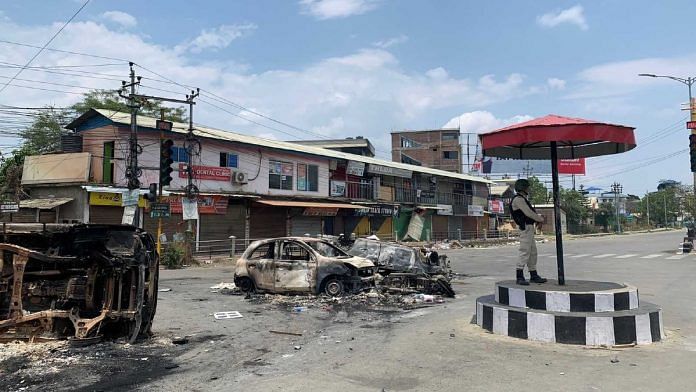It took nearly 78 days for news from Manipur to reach the world. The paroxysm of rage and shame that echoed across India has now been felt quite literally throughout humanity because such is the nature of the internet. The reason why the incidents of violence from the state were hidden from us for so long is that the government of India, more often and more drastically than any other democracy, feels empowered to shut down the internet.
Chief Justice of India DY Chandrachud was right to say that this situation amounts to the “grossest of constitutional abuse” . But it is insufficient to identify the crisis only as the government’s failure to discharge its responsibility. The crucial task here is to restore public order and prevent this inhuman brutality.
Unconstitutional shutdowns
We can see clearly that there is a second constitutional crisis. A crisis in which the power to shut down all Internet communications for months is unconstitutionally exercised at the expense of the people’s civil rights and liberties. The source of that crisis is the erroneous judgment of the Supreme Court itself in Anuradha Bhasin vs Union of India. The route out of this crisis lies in the power of the Chief Justice of India and the Supreme Court.
Internet shutdowns are the broadest form of what US First Amendment law calls “prior restraint.” It involves the exercise of state power to ‘prevent’ speech, pre-emptively, and prohibiting its publications so it never reaches anyone. This is distinct from subjecting the speakers to civil liability or criminal prosecution once the speech has been made. A basic principle of the US Supreme Court’s First Amendment jurisprudence is that prior restraints are presumptively unconstitutional, even when speech might constitutionally be subjected to punishment post hoc.
Internet shutdowns are a form of blanket prior restraint, in which the government shuts down all communications—no matter how overwhelmingly innocent—in order to prevent a comparatively tiny amount of speech that is arguably prosecutable as sedition or incitement to violence. Because of the immense success of Unified Payments Interface (UPI), prolonged Internet shutdowns disrupt the entire flow of payments through the economy. Such disruption inflicts on the poor all the harms of demonetisation, but on a continuing and indefinite basis. Shutdowns like those in Manipur and Kashmir—which last for more than 552 days—amount to an economic war against the civil society in today’s digital India.
Also read: Supreme Court order on CEC is bringing back old era of judicial activism, declare CJI a God
Misreading of US cases
In the Anuradha Bhasin case, the Supreme Court established a baseline of constitutional acceptability for internet shutdowns, moderated by limitations that have turned out to be utterly insubstantial. The Court extensively surveyed the US constitutional jurisprudence, but in doing so it made a fundamental mistake—relying on inapposite cases concerning criminal liability for sedition or incitement, not cases of prior restraint. Had it considered the US Supreme Court’s refusal in 1971 to enjoin the publication of the Pentagon Papers by The New York Times, the Indian Supreme Court would have been compelled to draw different conclusions.
The Anuradha Bhasin judgment asserted the primacy of “proportionality” analysis in the conflict between government powers to ensure security and fundamental rights. In dealing with what the Court itself called the “drastic” remedy of Internet shutdown, it asserted that the intervention must be “necessary”. It must be the “least restrictive means” to achieve the government’s necessary purpose and it must be subject to judicial review. But having declared this “proportionality” analysis to be the sovereign requisite—a conclusion only tenable given the misreading of the US cases—the Court utterly failed to apply it.
Can shutting down the entire system of social communications and completely crashing the payments economy for months be “proportional” to the necessary problem of preventing the incitement of intercommunal riots? If this government intervention is the “least restrictive means,” what are the other more restrictive means the government would not be allowed to use? The mind boggles.
The complete prior restraint on all speech and destruction of the market economy has been prolonged for 78 days in Manipur but public order has not been restored yet. In what sense can it be “necessary” and “proportional” that it should continue?
If a shutdown must be subject to judicial review, must the government not be under obligation to present reasons for the action beyond the mere assertion of necessity? A blanket prohibition on all communications and ordinary payments without detailed justification is by definition not a “reasonable restriction” and its approval by judges is not a “judicial review.”
Lastly, a valid assessment of the proportionality of government action would have to consider the direct harm caused by its actions of shutting down the Internet. In Manipur, we see to what extent the Supreme Court blinded itself in the Anuradha Bhasin case. Shutting down the internet prevents India and the world from seeing the harm caused by public disorder, and crimes against humanity. It also stops people from both demanding and empowering the government action to protect its people. Shutdowns don’t create the social and political will to safeguard our people, but rather a cloak for government to hide its shame.
Mishi Choudhary is a technology lawyer in Delhi and Eben Moglen is a legal scholar. Views are personal.



